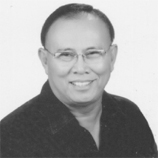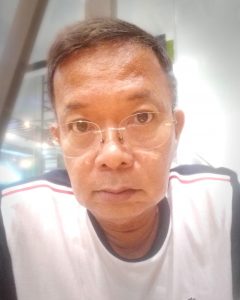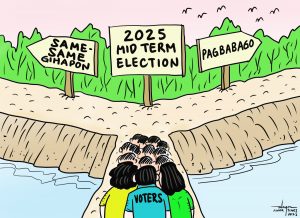By Herman M. Lagon
Being an ASEAN citizen now is like having two passports: one for access to our local identity and another for the great worldwide community. Developing a global perspective in a world where geography is progressively blurred by technology, economy, and culture is essential. This is a need for survival in our interconnected, fast-paced environment, not only a luxury or optional add-on to our education or career.
When we discuss “Enhanced Connectivity and Resilience,” the 57th ASEAN Anniversary theme speaks to preparing ourselves to flourish in an environment that calls for flexibility and cooperation. Often hailed as the next economic powerhouse in the world, ASEAN provides a special microcosm for studying world dynamics. We stand at the junction of opportunity as members of this varied but unified bloc, but only if we understand that ASEAN and global thinking are now entangled requirements.
One cannot exaggerate the urgency of this mental change. Long gone are the days when one could afford to think locally or envision a career, life, or education limited inside the boundaries of one’s own backyard. Not only trends—digital nomads, the explosion of e-commerce, and the growing mobility of talent across borders—define the new normal. Millions of Filipinos already live this reality, working overseas or doing international online jobs. They are the forerunners of a time when world connectivity will be as normal as breathing.
This worldwide network is personal and practical, not a theoretical idea. In my own life, I have seen family members and friends scattered over continents, linked not only by blood but also by shared experiences of living in different cultures, working in different environments, and adjusting to different societal standards. It reminds us that the global perspective emphasizes human relationships across boundaries rather than only politics or economics.
When I consider my path, which has taken me across many ASEAN nations and beyond for professional development, research, and leisure, being globally minded is not only helpful but also absolutely necessary. This view has been strengthened by the opportunities I have had to send faculty members and students overseas during my tenure as Principal of Ateneo de Iloilo and Director of International Affairs and Linkages in ISUFST. Seeing these students and fellow professionals widen their horizons, pick up fresh skills, and create international relationships has persuaded me that our future depends on our capacity to see beyond our close surroundings.
In this context, though, what does connectivity mean? It goes beyond simply being able to travel or connect with people abroad. It’s about developing deep bonds, knowledge-sharing, and networks of innovation and progress-oriented driving force. It’s about realizing that our local activities have worldwide effects and that our worldwide ties might enhance our local experiences.
Conversely, resilience is the ability to negotiate the difficulties this connectivity presents. It will help us adapt, survive, and flourish in a world with more regular global disturbances, environmental changes, and economic swings. Armed with the knowledge and relationships we have acquired along the way, resilience is our capacity to recover from setbacks, grow from mistakes, and keep on ahead.
Understanding these thematic concepts is made perfect by the ASEAN integration process. It presents a rainbow of possibilities for us: simpler travel, more reasonably priced goods, better employment possibilities, and more choices for education. Still, these chances carry obligations. We have to be ready to welcome diversity and inclusivity, be open to fresh ideas, and aggressively search out new contacts to fully benefit from what ASEAN has to offer.
A central component of this process is cultural sensitivity. It’s about appreciating and understanding the variances that define every culture, not only about being courteous to others. It is about realizing that these variations present chances for development rather than challenges. Cultural sensitivity is the link that will connect you to a larger world, whether you are making daily contact with people from many backgrounds or working on a group project involving prople from many ASEAN nations.
Our dedication to internationalizing at the Iloilo State University of Fisheries Science and Technology (ISUFST) reflects this awareness. Under the direction of our University President, Dr. Nordy Siason Jr., we have brought our vision, mission, and quality policies into line with ASEAN objectives and global standards. This alignment is about making sure our infrastructure, faculty, and students are ready to compete and succeed worldwide, not only about getting recognition or raising our rankings.
In this sense, our ASEAN neighbors and Japan teach us a great deal. Particularly in the face of natural disasters, Japan’s model of innovation and resilience provides insightful ideas for how we might strengthen our disaster response and preparation systems. Particularly in infrastructure and education, Singapore’s emphasis on efficiency and connectivity offers a model for better equipping our people for the demands of the global economy. Thailand’s focus on cooperation and cultural preservation reminds us to keep our cultural legacy while embracing modernism.
Driven by a robust manufacturing industry and an emphasis on education, Vietnam’s fast economic development emphasizes the need for strategic planning and investment in human capital. Each of Indonesia, Brunei, and Malaysia provides special lessons in striking a balance between modernism and tradition, encouraging social cohesiveness and fostering inclusivity in varied societies.
Still, we also have much to offer; it’s not only about picking lessons from others. The Philippines’ great sense of community, resiliency against hardship, and rich cultural legacy can motivate our ASEAN neighbors as well as the larger globe. Essential in creating a more connected and resilient ASEAN, our culture of “pagkapwa-tao” and “Bayanihan” capture the spirit of communal effort and solidarity.
Let us pledge to create a more resilient and linked ASEAN community. This means engaging in trade programs or research partnerships and being open to learning from many cultures, adjusting to new challenges, and discovering ways we might help the world from anywhere we live. Whether you wind up staying in your native country or working overseas, the global perspective will help you negotiate the complexity of contemporary society and have a significant influence.
Being an ASEAN citizen today means embracing a dual identity rooted in our local culture and experiences and extending to the world community. It implies realizing that the futures of people from many backgrounds, cultures, and countries entwine with ours. It means forging relationships that are not only beneficial but essential for our resilience and collective progress. It also means preparing for a world that calls for both adaptation and cooperation by our institutions, ourselves, and communities. Let’s recommit ourselves to these values as we honor the 57th ASEAN anniversary and cooperate to build a better, more linked, and resilient future for all.
***
Doc H fondly describes himself as a ”student of and for life” who, like many others, aspires to a life-giving and why-driven world grounded in social justice and the pursuit of happiness. His views do not necessarily reflect those of the institutions he is employed or connected with.



